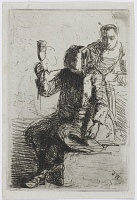The Dutchman Holding A Glass | ||
| Number: | 4 | |
| Date: | 1857 | |
| Medium: | etching | |
| Size: | 82 x 56 mm | |
| Signed: | 'J. W.' at lower right | |
| Inscribed: | no | |
| Set/Publication: | no | |
| No. of States: | 2 | |
| Known impressions: | 4 | |
| Catalogues: | K.4; M.3; T.- | |
| Impressions taken from this plate (4) | ||
The Dutchman Holding a Glass probably dates from 1857 or early 1858.
A date between 1855 and 1858 is suggested by both the style and signature. It is signed only with Whistler's initials 'J.W.', whereas when Whistler prepared to publish the 'French Set' in November 1858, etchings originally signed with his initials, such as Little Arthur [8], and Annie [7], were re-signed 'Whistler'.
The style of drawing and the subject resemble such romantic pen drawings by Whistler as 'Then Sir - I am the King of Spain!!!' [m0166], Old man [m0171] and Man smoking [m0188], which date from between 1854 and 1855. It also resembles the various techniques tried out in the vignettes adorning his first etching, Sketches on the Coast Survey Plate [1].
The stylisation of the girl's face is similar to that seen in etchings such as An Artist Sketching [23], and related sketches, such as Succès d'Erneste à Cologne. 1 As a formula for indicating faces, this rendering of mask-like features is also seen in later pen drawings such as Two figures [m0311].
The principal stylistic features in The Dutchman Holding a Glass indicate a close relationship between Whistler's drawings and etchings, and suggest a very early date in Whistler's etching career. However, in technique and composition, it does not look like the other known etching of that early period, etched in Paris, Au Sixième [3]. The assurance of the style, with its broad, vigorous use of line, suggests a date towards the end of Whistler's student days in Paris, in 1857 or 1858.
The principal stylistic features in The Dutchman Holding a Glass indicate a close relationship between Whistler's drawings and etchings, and suggest a very early date in Whistler's etching career. However, in technique and composition, it does not look like the other known etching of that early period, etched in Paris, Au Sixième [3]. The assurance of the style, with its broad, vigorous use of line, suggests a date towards the end of Whistler's student days in Paris, in 1857 or 1858.
1: r.: Succès d'Erneste à Cologne; v.: Tracing of recto [m0271].
Lochnan suggested that it was inspired by a visit to the Manchester Art Treasures Exhibition in 1857, and was actually etched back in Paris at the 'press in the rue Campagne- Première.' 2
2: Lochnan 1984, pp. 24-25.
